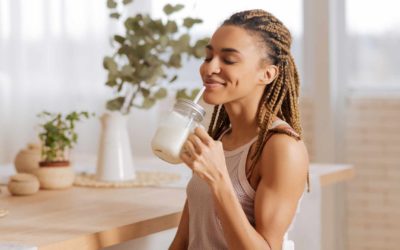Let’s look at some of the natural ways you can maintain and boost your energy without relying on caffeine or ‘energy’ drinks.
Staying Hydrated
Feeling tired or exhausted can be one of the first little warning signs of dehydration. Even being slightly dehydrated can affect your metabolism and lead you to feeling a little out of sorts. Staying hydrated is key in keeping energy levels up.
How much water should you be drinking on a daily basis?
There’s lots of debate on how much water you should be drinking daily. Some even go so far as to mention how much water you should be drinking hourly!
You don’t need a special app or schedule. The safest way to stay on top of your hydration levels is to let your thirst guide you. Simply, drink water or other fluids when you’re thirsty.
Avoid things like energy drinks and caffeine when you are noticeably dehydrated, as these stimulants can sometimes have the opposite effect on your hydration levels.
Healthy eating
Did you know reducing or avoiding carbohydrates can have a very positive effect on your energy in general?
This may surprise you, as carbohydrates are often what we’re taught when we’re young are a primary source of energy. While carbohydrates do give your body a quick energy boost, they also come with a crash which can leave you feeling tired or sluggish.
Energy-wise, it’s best to stick to whole grain foods or the ‘good’ carbohydrates, like brown rice, nuts, oats and sweet potato. These foods contain low glycemic carbohydrates which provide you with a steady energy release throughout the day, with no crash to boot!
Other foods that can provide you with a steady release of energy, as well as vitamins and nutrients, include quinoa, tuna, beans, chia seeds, oranges and bananas.
All of these foods can help you beat the midday slump. Snacking on vegetables or fruits packed with water like oranges or even cucumbers is also another way to beat dehydration.
Getting a good night’s sleep
This may sound a little obvious, but it’s something that we rarely address and tend to just accept as part of the grind. Improving on bad sleeping habits can dramatically help your daily energy levels.
Some things to think about when it comes to getting a good night’s sleep:
Keep a consistent sleep schedule
We want to work with our body clock, not against it. Going to bed and getting up at the same time each morning (even weekends!) will help set and regulate your body clock.
No caffeine/stimulants in the evening.
This should go without saying, but filling up on stimulants a few hours before you plan on going to bed is going to affect your sleep. Avoid tea and coffee in the evenings to allow your mind and body begin to rest and prepare for sleep.
Avoid TV/Phone at least one hour before bed
Screens are stimulants too. We may not think about it that way, and a lot of people would argue that it helps them relax in the evening, but being stimulated by television and your phone right before bed does not help you when trying to get a good night’s rest. Good sleep hygiene is just as important as remembering to brush your teeth.
If you’re already incorporating lots of these tips into your day, and still struggling with fatigue, schedule an appointment with one of our friendly GPs, and they can help assess if something else might be causing it.
Want to learn more? Check out this helpful article, “Healthy Sleeping Habits”.






